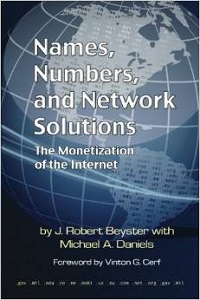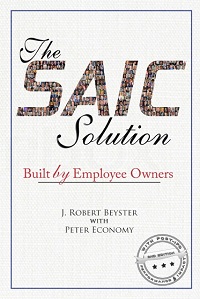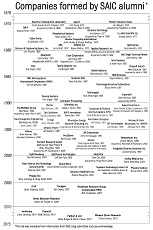Abundant widespread communication was an element in SAIC’s success story. I’m curious to know what you think were the most useful forums to SAIC’s employees, and why. I suspect the most useful was the Management Council, but I’m not sure.
Click on the comments link to share your thoughts.
- Bob
Here are my responses to previous weeks’ comments:
Jim Naber (Week 17): Sorry SAIC didn’t change your life…but we tried. And I’m sure Larry Kull had a lot to do with influencing your success at SAIC. I’m curious what you’ve been doing nowadays, if you’re still working with the same customers.
Joe Carlini (Week 17): I remember all the good times we had visiting you and others in Virginia Beach, and participating in the AMSEC Hall of Fame. AMSEC was clearly a turning point in SAIC history because it showed we could run a cost-competitive operation and still make money. If you see Carl Albero, give him my regards. In addition, if you feel like writing more about your experiences with SAIC culture — what was good and what was not so good — I would love to read it. And good luck with your new company. I’m sure Dave King must visit you periodically in the Tidewater area.
Peter Cohen (Week 17): I’m glad to hear SAIC had a positive impact on your getting an advanced education. I just finished clearing out my bookshelves, keeping only what was most important. All of my academic books from the University of Michigan were thrown out since they’re now dated. However, I’m still impressed with some of the papers I wrote a number of years ago. Hope your new job permits you to publish and talk on information systems to keep your brain ticking.
Andre LeCault (Week 17): We used every device we could think of to motivate employees to express themselves in a variety of forums at SAIC, hoping to pick up good ideas, and to detect flaws in ongoing programs or in proposal efforts. Meetings Week was the most important forum we established for exchanging ideas and I hope you got an opportunity to present your opinions there. The pre-board dinners were established so the employees and key managers had a place where they could meet the board members and express their feelings regarding actions the board was taking. What’s happened to you since you left the company? Or did you?
Hal Brode (Week 17): We are slowly making progress on the book we are writing on SAIC. Fourteen chapters are in some state of repair, and we have a publisher. Your book sounds interesting and I will be curious to read your comments on notable figures I had the good fortune to meet, like Albert and Dick Latter, Fred Wickner, Jim Woolsey, and of course Albert and Roberta Wohlstetter.
Telal Wassel (Week 16): I agree that the EPRI work was a turning point in the energy area. In addition to what you mention, Erdman and others were able to initiate the probabilistic risk analysis program at EPRI, which spread to other people in the company. An East Coast group (Joe) was also able to build a successful business based on our probabilistic risk analysis work. I have often wondered if the Egyptian business you started is still active at SAIC. It was certainly successful when you were running it, and it contributed — in my estimation — to other programs in the range business.





Quarterly Meetings Week and Management Council presentations and multi-casts allowed all of us to be informed, regardless of our location or position in the company. We truly had the opportunity to be employee-owners by participating.
Internal email distribution has been extremely useful when customer requirements suddenly changed and we needed an immediate help.
SAIC training allowed multiple SAIC employees to learn a new topic, while sharing lessons learned and project woes without exposing our problems to other companies.
For those of us down in the trenches, Meetings Week was very useful. We learned what was going on in other sectors of the company, got a sense of overall direction, and met people we didn’t ordinarily come in contact with. The stockholder’s meeting was also useful. Although you often seemed uncomfortable giving your annual speech, it was valuable to hear about the direction of the company coming from the horse’s mouth (sorry!).
Least effective were the audio tapes. They were hard to listen to and outdated by the time they were distributed.
Reply. I am still in San Diego. Since 2000 and for 5 years thereafter, my wife and I ran a small gift shop in Carlsbad then we retired for a second time. Now I do volunteer work at a local hospital and travel. It was quite a departure in the line of work, in one aspect from science to art, but I felt that there was some “art” in my science.
In 81, 82, and 83 I was totally consumed by development of the NPASS software so I wasn’t paying much attention to company wide communication. I think the reason I never felt out of the loop was the communication culture at IEPD. I don’t recall my boss (Dr. Glen Reynolds) ever throwing me out of his office. Even when my conversation was mundane, he was always there to talk. I’m probably guilty of having some of those mundane conversations just to see what would happen. I think the most useful forum for communication was the everyday communication between colleagues. From my perspective, this felt like a fundamental attribute of SAIC culture
From my perspective as a young employee, joining SAIC only 5 months before your retirement and coming from a very small company, the most useful communication method was/is ISSAIC. It is great to be able to read news within the company (from major contracts won to other employees’ personal stories) on a daily basis. Also, for those of us on the East Coast, it is especially nice to be able to watch the presentations from Meetings Week within days of the event and get an idea of what the major goals of the company are and where the company is headed.
As for the “why,” I joined SAIC to an off-site division where there was little connection to SAIC. ISSAIC allowed us to feel like a part of the company even though we were using another company’s offices, were surrounded by another company’s employees and often were treated (and labeled) as the other company’s employees.
Dr. Beyster,
Here is another suggestion that you will probably not be overwhelmed with:
Prospect Street
Its a simple title but works at 3 levels: SAIC location, prospect – vision and Prospect Street vs Wall Street.
Best wishes with your book.
Sincerely,
Ed Rumble
The TEC had in it’s yearly survey a question or questions concerning important sources of information for employees. The TEC produced many of these surveys.
I am sure these results are (or should have been) archived. Check with past
TEC Chairs (such as Bill Scott, etc).
I don’t recall the Management Council as being the main source of information,
but I could be wrong
Pete Ward
#59
One more semi-facetious title, inspired by the cartoon just outside your office door: “I Must Hurry — For there go my people, and I am their leader!”
Bob Wertheim
The most important communications opportunities for me were related to Management Council, but not the formal meeting(s) itself. It was possible, because everyone was in the same place at the same time to resolve multi-party issues in a series of ad hock meetings. The ability to corrall all of the geographically diverse SAIC interests in some program, proposal or marketing opportunity by circulating among the Management Week participants frequently allowed rapid closure on complex issues with all parties able to participate in person.
In writing this I recall sending you a memo, early in my SAIC career, critical of the time spent in meetings week sessions. I still believe that the explosive growth of formal interest group standing meetings was over the top – but I have come to believe that having the decision makers in one place with an opportunity to spend time working issues in person was one of the most important attributes of the company operation while I was there.
Allen
I love Bob Wertheim’s title thought! And as for communications channels, what I always remember telling employees is that they had to decide where to tune in – there were so many channels that there would be at least one that was right for everyone. The majority of employees didn’t attend Meetings Week, and so they didn’t seem to perceive that as communication with them. ISSAIC was the breakthrough, in so many ways – it changed the way the divisions where I worked did our business of marketing, writing proposals, finding out what contracts the company was winning (and losing), and it exponentially expanded my access to SAIC’s experts on every conceivable topic. It was communication with content.
Regards,
Gael
I felt the most effective aspect of communications was that there were so many permutations of how they simultaneously occurred
- top down (Mtgs week) and bottoms up (TEC)
- vertical (Sector to division) and horizontal (group-wide DMs, HR, Contracts etc)
- Informally (through networking and often skipping org levels of hierarchy) and formally (Mtgs week briefings, project control newsletter, issaic, etc)
- Retreats away from the office for division, group and sector level sessions on strategizing, planning or review
- Customer satisfaction findings to get source data on how our customers were perceiving us
- SAIC training classes to both learn about SAIC practices but also meet new people and hear about what it was like in their organization
- Mostly people would talk about how the best communication was when Dr. Beyster talked ad hoc about employee ownership without written comments but straight from the heart.